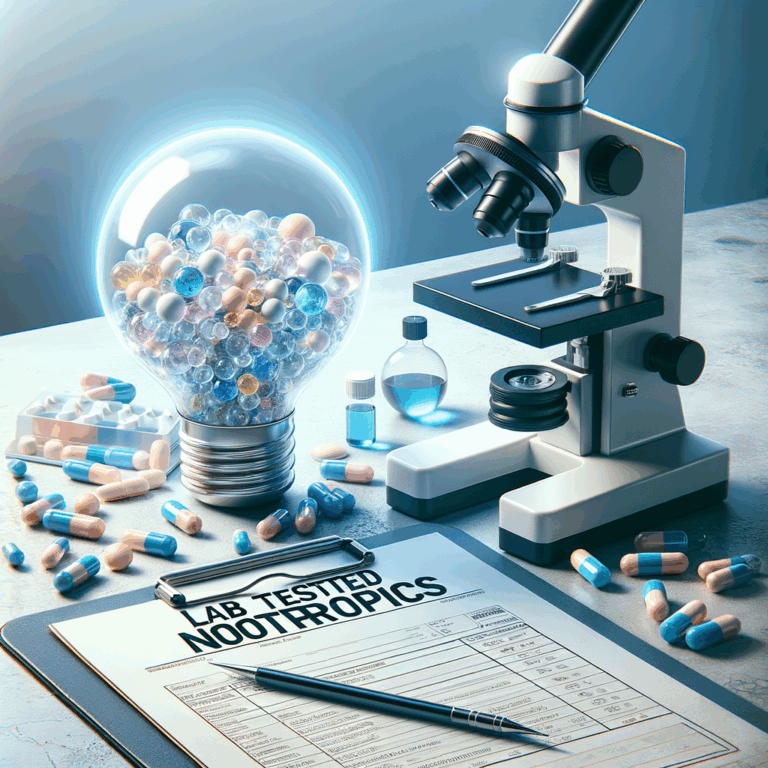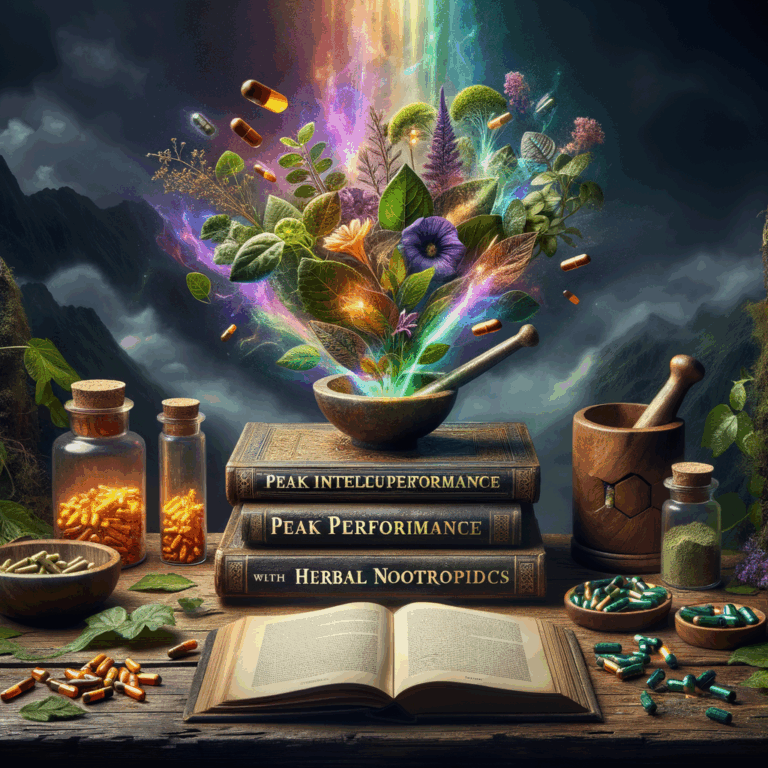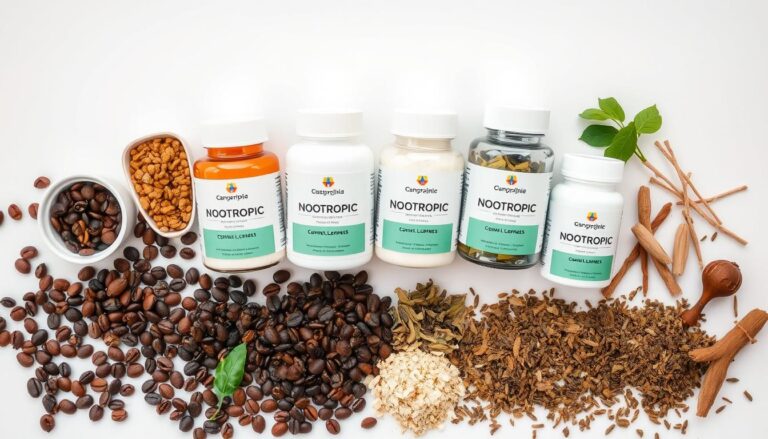- Understanding Nootropics for Anxiety
- What Are Nootropics?
- How Nootropics Can Help with Anxiety
- Popular Nootropics for Anxiety
- 1. L-Theanine
- 2. Rhodiola Rosea
- 3. Ashwagandha
- Other Promising Nootropics
- 4. Bacopa Monnieri
- 5. GABA (Gamma-Aminobutyric Acid)
- Nootropics Stack for Anxiety
- Dosage Recommendations
- Potential Side Effects of Nootropics
- Lifestyle Changes to Complement Nootropics
- Regular Exercise
- Balanced Diet
- Mindfulness Practices
- Conclusion
- FAQs
- References
Understanding Nootropics for Anxiety
Anxiety can feel like a heavy weight on your shoulders. It comes in many forms and can affect anyone at any time. While traditional treatments like therapy and medication can be effective, many people are seeking alternative solutions. Nootropics have gained popularity as a potential way to reduce anxiety and enhance mood. Let’s explore what nootropics are and how they might help manage anxiety.
What Are Nootropics?
Nootropics, often called “smart drugs,” are substances that may improve cognitive function. This broad category includes natural supplements, herbs, and synthetic drugs. Many people believe these substances can boost memory, creativity, and motivation. Interestingly, some nootropics may also help with anxiety.
The term “nootropic” was coined in 1972 by Dr. Corneliu E. Giurgea. He defined a nootropic as a substance that enhances learning and memory while being safe and non-toxic. Since then, research has expanded significantly, revealing a variety of options designed to improve not just cognitive function but also mental well-being.
How Nootropics Can Help with Anxiety
Anxiety often results from an imbalance of neurotransmitters in the brain. These chemicals, such as serotonin, dopamine, and norepinephrine, play crucial roles in regulating mood. Nootropics might help restore this balance, leading to improved mental health.
Some nootropics can enhance blood flow to the brain, increase energy levels, and reduce stress. When you optimize your cognitive function, you might find it easier to manage anxiety. Many users report that they experience calmer thoughts and improved moods after using these substances regularly.
Popular Nootropics for Anxiety
When it comes to nootropics for anxiety, several options are available. Each of them has unique properties that might help reduce feelings of anxiety and improve overall mood. Below, we will cover some popular choices.
1. L-Theanine
L-Theanine is an amino acid commonly found in green tea. It promotes relaxation without causing drowsiness. Research suggests that L-Theanine increases alpha brain wave activity, which is linked to a relaxed state.
Many people take L-Theanine to help reduce their anxiety levels, especially in stressful situations. Studies reveal that it can lower heart rate and blood pressure, promoting a calming effect. It’s especially effective when combined with caffeine, as it smooths out the jittery effects commonly associated with caffeine intake.
2. Rhodiola Rosea
Rhodiola Rosea is a powerful adaptogen that helps the body manage stress. It’s known for boosting energy and reducing fatigue, which can be particularly helpful for individuals dealing with anxiety.
This herb has been studied for its ability to enhance mood. Some research shows that it can lower cortisol levels, the hormone associated with stress. Lower levels of cortisol can lead to improved mood and a calmer mind.
3. Ashwagandha
Ashwagandha is another adaptogen that has gained popularity in recent years. It helps the body adapt to stress and can significantly reduce anxiety levels. This herb may lower cortisol levels, which, as mentioned, helps improve mood.
Studies have found that ashwagandha supplementation leads to significant reductions in anxiety and stress. It can also enhance overall well-being, making it a valuable addition to your nootropic stack.
Other Promising Nootropics
While L-Theanine, Rhodiola Rosea, and Ashwagandha are among the top choices, several other nootropics can also provide anxiety relief.
4. Bacopa Monnieri
Bacopa Monnieri is a traditional herb used in Ayurvedic medicine. It’s known for enhancing brain function and reducing anxiety levels. Research indicates that it can improve memory and cognitive function, making it a great choice for those dealing with anxiety.
Bacopa Monnieri works by modulating neurotransmitter systems in the brain. Regular use may lead to lasting improvements in both mood and cognitive performance.
5. GABA (Gamma-Aminobutyric Acid)
GABA is a neurotransmitter that plays a crucial role in reducing neuronal excitability. Supplementing with GABA may help induce calmness, making it a popular choice for anxiety relief.
While research on GABA supplementation is mixed, many users report feeling more relaxed after consuming GABA-rich supplements. It’s crucial to combine GABA with other nootropics for enhanced effects.
Nootropics Stack for Anxiety
Creating a nootropics stack can optimize the effects of individual nootropics. A well-rounded stack includes various compounds to address different aspects of anxiety. Below are some combinations to consider.
| Nootropic | Benefits |
|————————|—————————————–|
| L-Theanine & Caffeine | Calming focus and energy boost |
| Rhodiola & Ashwagandha | Stress reduction and mood enhancement |
| Bacopa & GABA | Memory improvement and relaxation |
Combining these nootropics can create a synergistic effect, enhancing mood and reducing anxiety. However, consult a healthcare provider before starting any new supplement regimen.
Dosage Recommendations
Understanding the appropriate dose for each nootropic is vital. Dosages can vary depending on individual needs and sensitivity. Here are general guidelines to consider, but always consult a healthcare professional.
| Nootropic | Recommended Dosage |
|————————|————————————-|
| L-Theanine | 100–400 mg per day |
| Rhodiola Rosea | 200–400 mg per day |
| Ashwagandha | 300–600 mg per day |
| Bacopa Monnieri | 300–600 mg per day |
| GABA | 500–1000 mg per day |
Starting with lower doses can help you assess your tolerance. Gradually increase the dosage until you find what works best for you.
Potential Side Effects of Nootropics
While nootropics can offer benefits, they are not without risks. Some individuals may experience side effects, especially when taking high doses or combining several nootropics. Common side effects include:
– Headaches
– Gastrointestinal discomfort
– Sleep disturbances
– Fatigue
It’s crucial to listen to your body. If you experience adverse effects, discontinue use and consult a healthcare provider.
Lifestyle Changes to Complement Nootropics
Incorporating nootropics into your routine is only one part of managing anxiety. Lifestyle changes can further improve mood and reduce anxiety levels. Consider these tips:
Regular Exercise
Engaging in regular physical activity boosts the release of endorphins, which act as natural mood lifters. Aim for at least 30 minutes of moderate exercise most days.
Balanced Diet
A balanced diet rich in vitamins and minerals can enhance brain function. Foods high in omega-3 fatty acids, antioxidants, and vitamins B, C, and D can support overall cognitive health.
Mindfulness Practices
Practices like meditation, yoga, and deep breathing can reduce stress and anxiety. These techniques promote relaxation and improve mental clarity.
Conclusion
Nootropics for anxiety present a promising alternative to traditional treatments. While they can help reduce anxiety and brighten your mood, it’s essential to consider your overall lifestyle. A holistic approach, including nootropics and lifestyle changes, can lead to significant improvements in your mental well-being.
By exploring nootropics tailored to your needs, you may find the key to managing anxiety effectively. As always, consulting with a healthcare provider will ensure that you’re making the best choices for your health and well-being.
FAQs
1. What are nootropics?
Nootropics are substances that may enhance cognitive function, including memory, creativity, and mood.
2. How do nootropics help with anxiety?
Nootropics can help balance neurotransmitters, boost energy, and promote a relaxed mental state.
3. Are nootropics safe?
Generally, many nootropics are considered safe when taken at recommended dosages. However, individual responses may vary.
4. Can I take nootropics with other medications?
Always consult a healthcare provider before combining nootropics with other medications to avoid interactions.
5. How quickly can I expect results from nootropics?
Some individuals notice effects within hours, while others may require weeks of consistent use.
6. Do nootropics have side effects?
Yes, some nootropics can cause side effects like headaches, gastrointestinal discomfort, and fatigue.
7. Is there a best time to take nootropics?
The timing can vary based on the nootropic. For example, L-Theanine is often taken with caffeine for added focus.
8. Can I take multiple nootropics at once?
Yes, many people create stacks with complementary nootropics for improved effects, but start with lower doses.
9. Are there age restrictions for taking nootropics?
Generally, nootropics are designed for adults. Consult a healthcare provider for specific cases involving younger individuals.
10. Where can I buy nootropics?
You can find nootropics in health stores, online retailers, and herbal shops. Always choose reputable brands.
References
1. Healthline – Nootropics
2. WebMD – Rhodiola
3. RxList – L-Theanine
4. Verywell Mind – Ashwagandha
5. PubMed – Bacopa Monnieri



